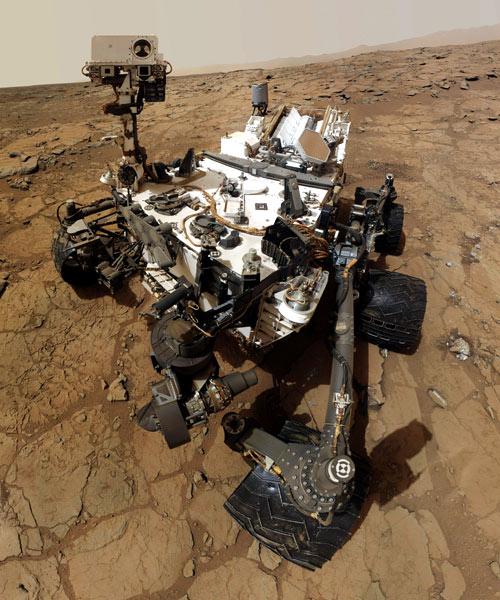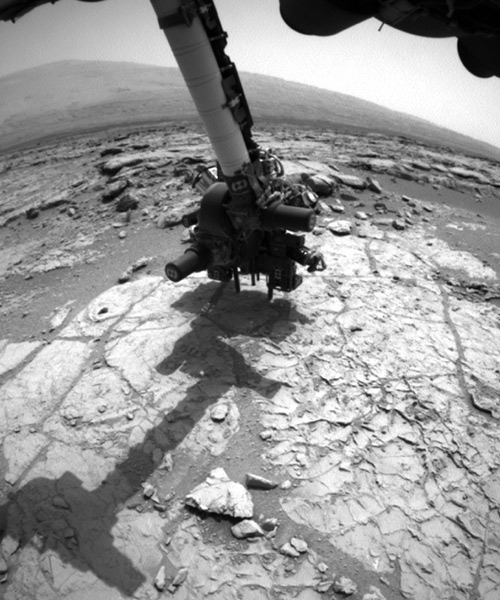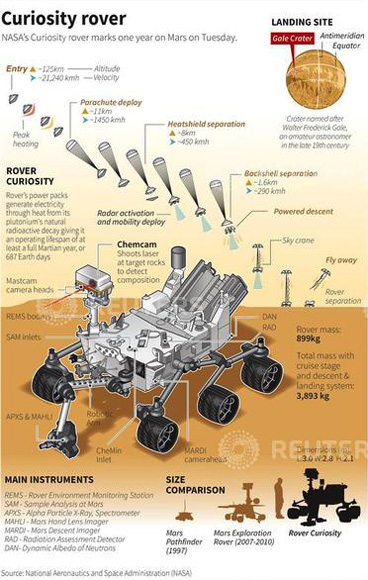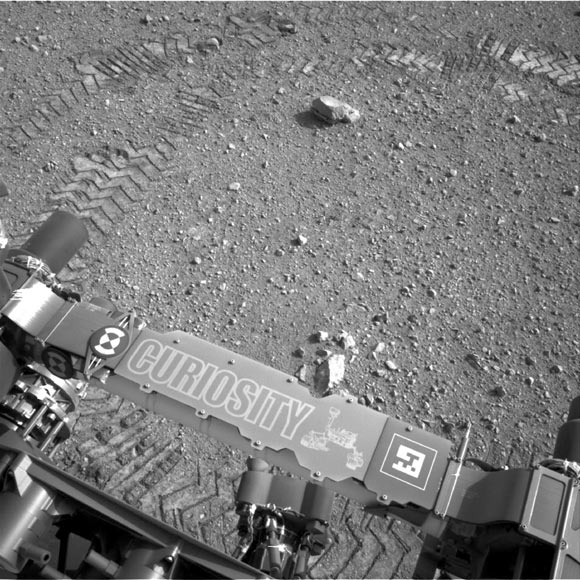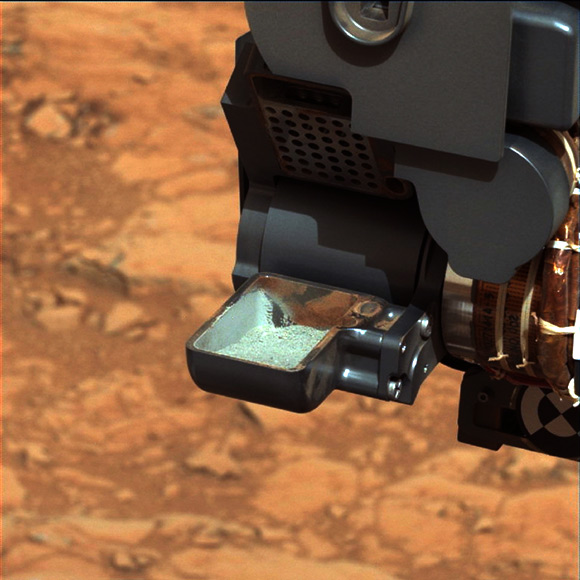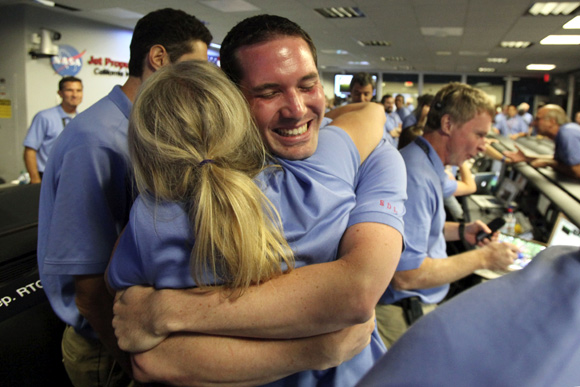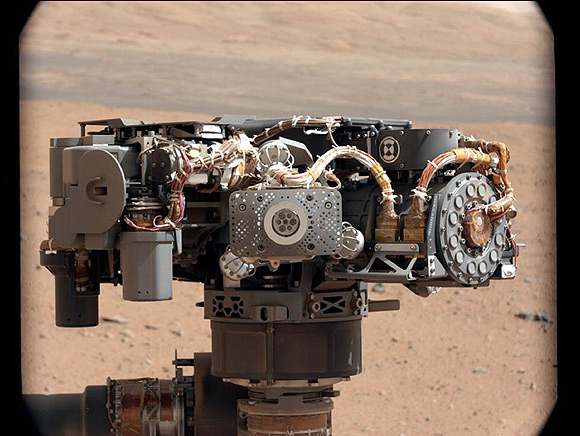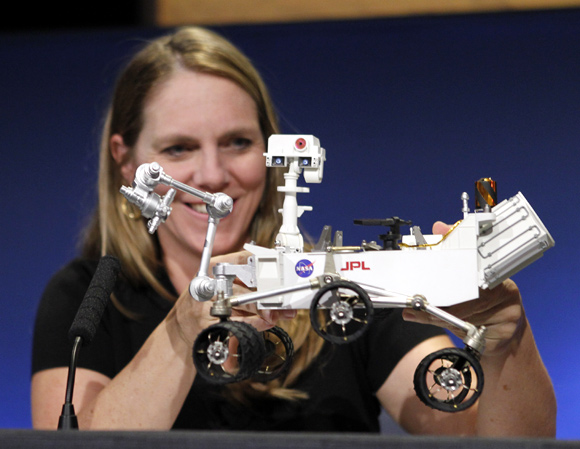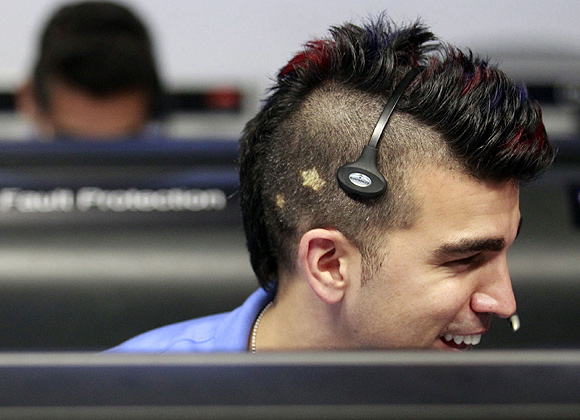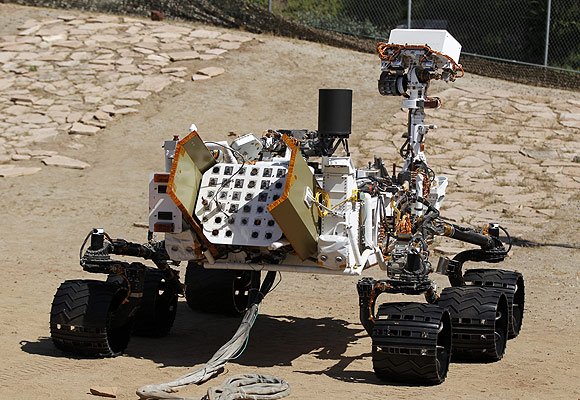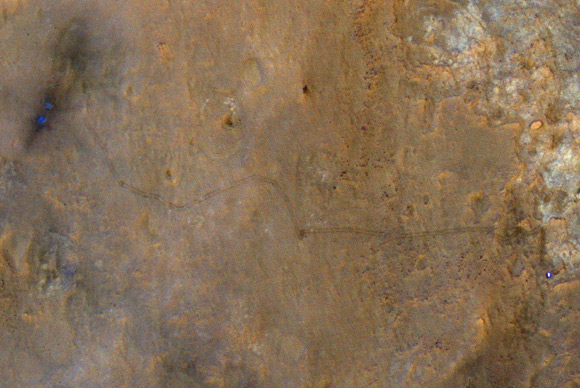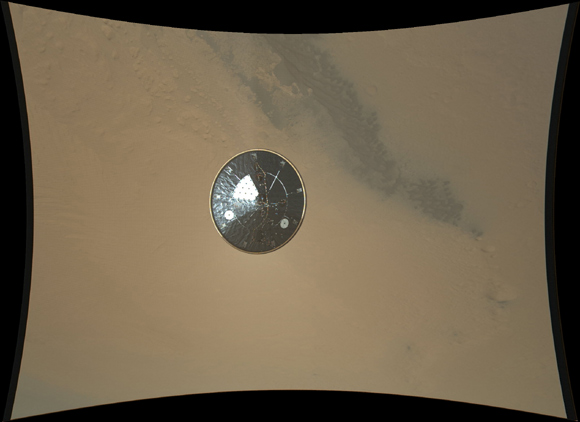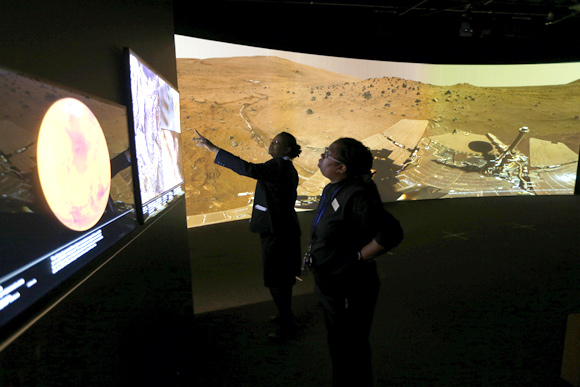 | « Back to article | Print this article |
PIX: Curiosity's 1st birthday on Mars, celebrations on earth
NASA's Curiosity rover has completed one year on Mars. The car-sized robotic rover successfully landed on Mars on August 6, 2012, and has achieved its main goal of revealing ancient Mars could have supported life.
Since its successful landing on the Red Planet it has provided more than 190 gigabits of data; returned more than 36,700 full images and 35,000 thumbnail images; fired more than 75,000 laser shots to investigate the composition of targets; collected and analysed sample material from two rocks; and driven more than 1.6 kilometers.
Its journey and explorations in the past one year have been presented in this photo feature.
Click NEXT to see more PHOTOS…
PIX: Curiosity's 1st birthday on Mars, celebrations on earth
"Successes of our Curiosity -- that dramatic touchdown a year ago and the science findings since then -- advance us toward further exploration, including sending humans to an asteroid and Mars," said NASA Administrator Charles Bolden. "Wheel tracks now, will lead to boot prints later."
Curiosity team members at NASA's Jet Propulsion Laboratory (JPL) in Pasadena, Calif., will share remembrances about the dramatic landing night and the mission overall in an event that will air on NASA Television and the agency’s website.
Click NEXT to see more PHOTOS...
PIX: Curiosity's 1st birthday on Mars, celebrations on earth
Evidence of a past environment well suited to support microbial life came within the first eight months of the 23-month primary mission from analysis of the first sample material ever collected by drilling into a rock on Mars.
Click NEXT to see more PHOTOS...
PIX: Curiosity's 1st birthday on Mars, celebrations on earth
The wheel tracks of the Mars Curiosity rover are seen in the dust on Mars. A close inspection of the tracks reveals a unique, repeating pattern: Morse code for JPL. This pattern, visible as straight bands across the zigzag track marks, can be used as a visual reference to help the rover drive accurately.
Click NEXT to see more PHOTOS...
PIX: Curiosity's 1st birthday on Mars, celebrations on earth
The first sample of powdered rock from Mars extracted by the NASA's Curiosity rover drill. The image was taken after the sample was transferred from the drill to the rover's scoop. The scoop is 1.8 inches (4.5 centimeters) wide. The image has been white-balanced by NASA to show what the sample would look like if it were on Earth.
Click NEXT to see more PHOTOS...
PIX: Curiosity's 1st birthday on Mars, celebrations on earth
In this handout provided by the National Aeronautic and Space Administration (NASA), a replica of NASA's Curiosity Rover and members of the Mars Science Laboratory (MSL) science team pass the presidential viewing stand during the inaugural parade honoring US President Barack Obama in Washington, DC.
Click NEXT to see more PHOTOS...
PIX: Curiosity's 1st birthday on Mars, celebrations on earth
Brian Schratz hugs a colleague as he celebrates a successful landing inside the Spaceflight Operations Facility for NASA's Mars Science Laboratory Curiosity rover at Jet Propulsion Laboratory on August 5, 2012, in Pasadena.
Click NEXT to see more PHOTOS...
PIX: Curiosity's 1st birthday on Mars, celebrations on earth
In this image taken by Curiosity's Mast Camera, the Alpha Particle X-Ray Spectrometer (APXS) on NASA's Curiosity rover is pictured, with the Martian landscape in the background on the 32nd Martian day, or sol, of operations on the surface on September 7, 2012.
This image lets researchers know that the APXS instrument had not become caked with dust during Curiosity's dusty landing.
Scientists enhanced the color in this version to show the Martian scene as it would appear under the lighting conditions we have on Earth, which helps in analyzing the terrain.
Click NEXT to see more PHOTOS...
PIX: Curiosity's 1st birthday on Mars, celebrations on earth
Jennifer Trosper, Mars Science Laboratory (MSL) mission manager, points out the communications antenna on a model of NASA's Mars science rover Curiosity as she speaks during a news conference at NASA's Jet Propulsion Lab in Pasadena, California.
Click NEXT to see more PHOTOS...
PIX: Curiosity's 1st birthday on Mars, celebrations on earth
Activity lead Bobak Ferdowsi, who cuts his hair differently for each mission, works inside the Spaceflight Operations Facility for NASA's Mars Science Laboratory Curiosity rover at Jet Propulsion Laboratory in Pasadena, California.
Click NEXT to see more PHOTOS...
PIX: Curiosity's 1st birthday on Mars, celebrations on earth
An engineering model of NASA's Curiosity Mars rover is seen from the rear in a sandy, Mars-like environment named the Mars Yard at NASA's Jet Propulsion Laboratory in Pasadena, California.
Click NEXT to see more PHOTOS...
PIX: Curiosity's 1st birthday on Mars, celebrations on earth
NASA's Mars Science Laboratory rover Curiosity appears as a bluish dot near the lower right corner of this enhanced-color view from the High Resolution Imaging Science Experiment (HiRISE) camera on NASA's Mars Reconnaissance Orbiter.
The rover's tracks are visible extending from the landing site, "Bradbury Landing," in the left half of the scene. Two bright, relatively blue spots surrounded by darker patches are where the Mars Science Laboratory spacecraft's landing jets cleared away reddish surface dust at the landing site.
Click NEXT to see more PHOTOS...
PIX: Curiosity's 1st birthday on Mars, celebrations on earth
In this handout image provided by NASA a color full-resolution image shows the heat shield of NASA's Curiosity rover and was obtained during descent to the surface of Mars. The image was obtained by the Mars Descent Imager instrument known as MARDI and shows the 15-foot (4.5-meter) diameter heat shield when it was about 50 feet (16 meters) from the spacecraft.
This image shows the inside surface of the heat shield, with its protective multi-layered insulation. The bright patches are calibration targets for MARDI. Also seen in this image is the Mars Science Laboratory Entry, Descent, and Landing Instrument (MEDLI) hardware attached to the inside surface.
Click NEXT to see more PHOTOS...
PIX: Curiosity's 1st birthday on Mars, celebrations on earth
Curiosity's 360-degree landing-site panorama now includes the highest point on Mount Sharp visible from the rover in this NASA handout image.
The Martian mountain rises 3.4 miles (5.5 kilometers) above the floor of Gale Crater. Geological deposits near the base of Mount Sharp are the destination of Curiosity's Mars mission.
Click NEXT to see more PHOTOS...
PIX: Curiosity's 1st birthday on Mars, celebrations on earth
Staff at the National Maritime Museum look at their new Visions of the Universe exhibition, which includes images of Mars generated by NASA's Curiosity Rover, in Greenwich, London.
TOP photo features of the week
Click on MORE to see another set of PHOTO features...
